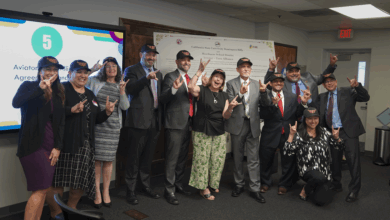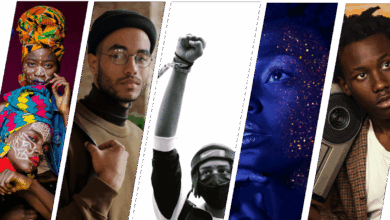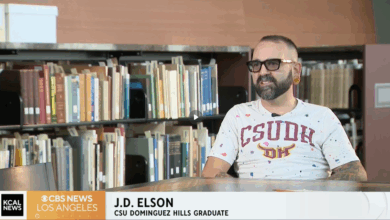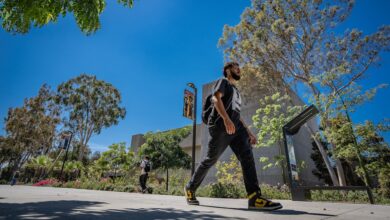
CSUDH welcomed U.S. Senator Laphonza Butler (D-CA) and the Born This Way Foundation (BTW) to campus on Feb. 22 for a Gen Now Youth Town Hall on mental health. The event brought together youth mental health advocates, students, faculty, and administrators for a panel discussion on ways to better identify the mental health needs of young people and improve the quality and availability of services in the spaces where they’re most needed.
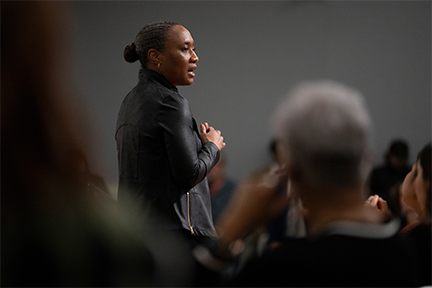
Butler was appointed to the Senate in October 2023 by Gov. Gavin Newsom to fill the seat left vacant after the death of Dianne Feinstein. Since her appointment, she has conducted listening sessions with young people across the state on topics including mental health, reproductive freedom, and the future of our democracy.
She partnered with BTW, Butler says, because the most effective and lasting solutions to the challenges facing young people are the ones that are formed and invested in together. “[These are the] solutions where we all feel heard and seen, and where we know that we are collectively trying to make a difference.”
Cynthia Germanotta co-founded BTW with her daughter Stephanie, better known as Lady Gaga, to support youth mental health through youth-driven research, programs, and strategic partnerships that validate the emotions of young people and eliminate the stigma surrounding mental health.
In his opening remarks to a near-capacity audience at the Innovation & Instruction lecture hall, CSUDH President Thomas A. Parham welcomed Butler and the BTW, thanking them for elevating the issue of youth mental health and amplifying the voices of young people.
“Our university should be a place where topics of this magnitude become the regular subject of critical discourse and analysis,” Parham said. “We must be able to understand what it is our young people are going through before we try to design interventions to help them. That’s our purpose here today.”
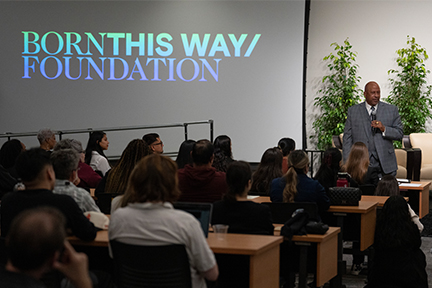
Da’Mohntae Walker, a senior occupational therapy major at CSUDH, said ahead of the event that open and honest discussions like the Gen Now Youth Town Hall were crucial to creating safe spaces for young people to talk about what they need. “They bring awareness to topics that people are sometimes reluctant to address, and they can empower people to seek help if they feel they can relate to the experiences of the speakers.”
Joining Walker on the panel were Meera Verma, a writer and TEDx speaker who has inspired young people throughout the country with her own mental health journey, and Elektra, manager of frontline services for Project Q, a Los Angeles-based nonprofit that helps LGBTQ+ youth transition from institutional systems of care. Germanotta and Juan Acosta, a national mental health advocate, co-moderated the panel discussion.
“One in five people in the U.S. are diagnosed with mental illness, but five in five people have mental health,” Verma told the panel. “We all have mental health that deserves to be taken care of, that deserves to be seen and acknowledged and validated. Showing up and being there for someone is what saves a life.”
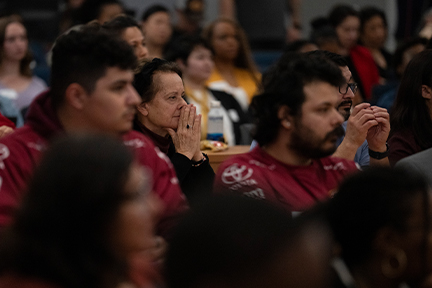
For LGBTQ+ youth transitioning from foster care or incarceration, Elektra says the fear of not being accepted or heard because of their identity exacerbates existing mental health challenges and convinces some that life on the streets is their only option.
“There are a lot of trans youth who are either not accepted in shelters or put in shelters where they don’t feel safe,” he said. “Accessing care is already hard enough. When you worry about if the care you want is going to accept you, that adds a whole other layer.”
Walker’s own journey through grief and depression, he told the panel, taught him that “familiarity is a strong magnet” for young people who need help. “They want to get around people who know exactly what they’re going through.”
Raised in Watts by a single mother of three, Walker dropped out of college after her death to find a job and support his siblings. “Grief had drained me of all that I felt was great about myself.”
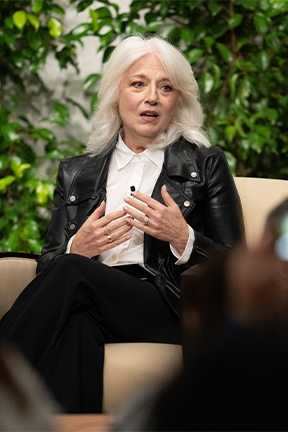
Inspired by his work at a physical rehabilitation center, Walker decided to return to CSUDH and study occupational therapy. “The university does a great job of encouraging peer to peer engagement about mental health, as well as faculty to peer engagement,” he said.
CSUDH has made a huge organizational commitment to ensuring that students receive holistic care, says Tiffany Herbert, director of student psychological services. “We have built a system designed to meet students’ mental health needs as well as basic needs such as food security, housing security, financial security, and childcare.”
“Since its inception almost two years ago, we’ve seen that the new model is making a difference in reducing the stigma around mental health, increasing awareness, improving social support, and providing direct care,” Herbert added.
Events like the one hosted by CSUDH and others she’s had around the state show that progress is being made, Butler said following the town hall. But recent data shows that much more still needs to be done.
“Black children, particularly girls, are attempting suicide at a 36 percent higher rate than five years ago. LGBTQ+ youths are attempting suicide at a 20 percent higher rate over the same period,” Butler said. “We need to be having these conversations in the community that is Dominguez Hills—one that is 91 percent students of color. This is where we need to be engaging most rigorously as we’re educating, developing, and supporting the leaders of tomorrow.”




